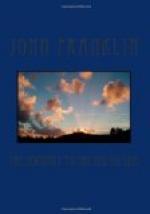We followed up the east border of the inlet about twenty-four miles and at length emerged into the opens sea, a body of islands to the westward concealing the channel by which we had entered. Here our progress was arrested by returning bad weather. We killed a bear and its young cub of this year on the beach near our encampment. We heartily congratulated ourselves at having arrived at the eastern entrance of this inlet which had cost us nine invaluable days in exploring. It contains several secure harbours, especially near the mouth of Back’s River where there is a sandy bottom in forty fathoms.
On the 3rd and 4th of August we observed a fall of more than two feet in the water during the night. There are various irregular and partial currents in the inlet which may be attributed to the wind. I have distinguished it by the name of Bathurst’s Inlet after the noble Secretary of State under whose orders I had the honour to act. It runs about seventy-six miles south-east from Cape Everitt but in coasting its shores we went about one hundred and seventy-four geographical miles. It is remarkable that none of the Indians with whom we had spoken mentioned this inlet, and we subsequently learned that in their journeys they strike across from the mouth of one river to the mouth of another without tracing the intermediate line of coast.
August 11.
Embarking at five A.M. we rounded Point Everitt and then encountered a strong breeze and heavy swell which, by causing the canoes to pitch very much, greatly impeded our progress. Some deer being seen grazing in a valley near the beach we landed and sent St. Germain and Adam in pursuit of them who soon killed three which were very small and lean. Their appearance however quite revived the spirits of our men who had suspected that the deer had retired to the woods. It would appear from our not having seen any in passing along the shores of Bathurst’s Inlet that at this season they confine themselves to the sea-coast and the islands. The magpie-berries (Arbutus alpina) were found quite ripe at this place, and very abundant on the acclivities of the hills. We also ascended the highest hill and gained a view of a distant chain of islands extending as far as the eye could reach, and perceived a few patches of ice still lingering round to some of them, but in every other part the sea was quite open. Resuming our voyage after noon we proceeded along the coast which is fringed by islands, and at five P.M. entered another bay where we were for some time involved in our late difficulties by the intricacy of the passages, but we cleared them in the afternoon and encamped near the northern entrance of the bay at a spot which had recently been visited by a small party of Esquimaux, as the remains of some eggs containing young were lying beside some half-burnt firewood. There were also several piles of stones put up by them. I have named this bay after my friend Captain David Buchan of the Royal Navy. It appears to be a safe anchorage, well sheltered from the wind and sea by islands; the bottom is sandy, the shores high and composed of red sandstone. Two deer were seen on its beach but could not be approached. The distance we made today was eighteen miles and three-quarters.




